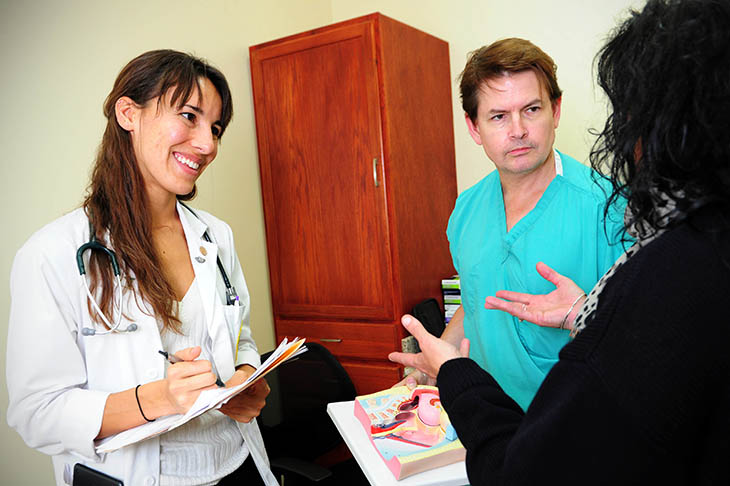Good health is a priority at Grace House

Tulane medical student Kate Yoder, left, and Dr. William “Rusty” Robinson talk with a Grace House resident at the student-led clinic, which provides healthcare evaluations and education to women in substance abuse treatment. (Photo by Cheryl Gerber)
A New Orleans woman who is striving to beat substance abuse is fortunate when she makes it to the top of the waiting list for a bed in the Grace House program. She doesn"t want an underlying illness such as diabetes or asthma to waylay her treatment.
A corps of medical students at Tulane University School of Medicine provides new Grace House clients with a health assessment and, if they need a referral for health care, the students work hard to make the arrangements.
“We're doing something really vital. The smallest thing can make a big difference.”—Zabeen Noorani, second-year medical student and clinic coordinator
The clinic at Grace House started nearly five years ago, when a Tulane medical student named Nikki Jodry approached Dr. William “Rusty” Robinson with the idea.
“It would be easy for us to make a contribution,” Robinson said. “I saw the need and, with 90 percent voluntary labor, we could make it happen relatively easily.”
Robinson, an OB/GYN professor, has been the attending physician for the medical students" project since its inception. Each week, a faculty member in OB/GYN, internal medicine or family medicine volunteers to guide the students.
Students must fulfill 50 service-learning hours during their first two years in medical school, choosing from opportunities such as this student-run clinic.
“Everyone deserves health care and there are limited healthcare resources,” said Katherine Rogg, a second-year medical student who took her turn recently as a clinic coordinator.
Kate Yoder, a second-year medical student, and Mary Kathryn Orsulak, a second-year MD/MPH student, developed a patient education program on topics the Grace House women said were of interest to them, including nutrition and how to keep from gaining weight, sexually transmitted diseases, and the effects of drugs on their bodies such as memory problems.
Students were able to obtain funding to provide PAP tests to check for cervical disease. They also devise methods to evaluate the effectiveness of their clinic.
A new group of student leaders is carrying the clinic forward this year.
